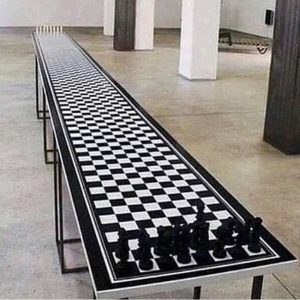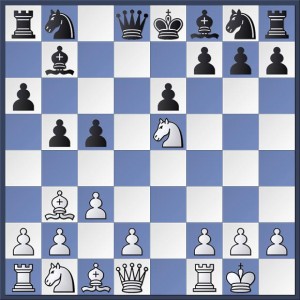
In these times of ‘social distancing’ chess players are having to become creative in order to pursue their favorite pass time! Thanks to Andrew Clarkson for sending me this amusing image!
With the Corona virus causing chaos and unprecedented disruption around the world, Hebden Bridge Chess Club and the local chess leagues have all been forced to adapt in order to continue their activities. All ‘over-the-board’ chess has been suspended until we are once again allowed to sit down across from each other to play the game we love. In the meantime, Hebden Bridge Chess Club has moved online. We’re still getting together on Monday evenings but now we’re doing it via Chess.com and Microsoft Teams.
Last Monday we hosted our first try at holding a Microsoft Teams video call so that we could look at some puzzles and a game together. More than 10 us managed to spend an hour and a half together analyzing. It was great fun, if a little ad hoc. I’ll be thinking about the best way for us to run these sessions in future so that we can get the most out of them. In the meantime though, for those that missed it, below are the three puzzle positions taken from the excellent ‘Invisible Chess Moves’ by Emmanuel Neiman and Yochan Afek.
I’ve set the board to display in puzzle mode. See if you can find the next move and do enough analysis to support your choice. Once you advance the game the solution will be displayed along with the required variations. Remember that you need to click on the bar above the board with the three dots in it to reveal and select the games in the viewer. At the end there is also a fairly wild game that we analysed at together.
Online activities for week commencing 6th April
This week we’ll continue with our online activities with another Microsoft Teams call on Monday the 6th followed by an online tournament on Chess.com. I’m also going to try out running some activities at other times and see how we get on. Here’s the schedule for this week.
- Monday 6th of April at 19:30 – Puzzles and Game Analysis
Microsoft Teams video call with three more puzzles and a game prepared and presented to us by Pete Leonard. Follow this Microsoft Teams link to join the video call. You can choose either to download the Microsoft Teams software to your computer, or join via your web browser. - Monday 6th of April at 21:00-22:00 – Online Blitz Tournament
We’ll play an online blitz tournament on Chess.com. 5 minutes each for all moves. This will be another ‘Arena’ tournament where you play as many games as you can in 1 hour and get re-paired as soon as a new opponent is available. You get awarded extra points for ‘streaks’ of wins. If you aren’t already a member of Chess.com then it’s easy and free to create an account. Once you’ve done that follow this link to find our online chess club and click on the orange ‘Join’ button. Once you’ve joined the club you can follow this link to register for the tournament – online registration opens at 20:00 – so you won’t be able to join the tournament before then. - Wednesday 8th of April at 16:00 – Online Rapidplay Tournament
Online rapidplay tournament on Chess.com. Follow this link to join. This will be a 10 mins each. This will be a 6-rounded Swiss format and should be finished by about 18:00. Online registration is from 15:00. - Good Friday 10th of April at 19:00 – How good is your chess?
This will be another Microsoft Teams video conference but this time a slightly different format. We’ll go through a Grand Master game and you’ll be asked to predict the next move and score points based on how well your answers correspond to the best moves in the game. At the end we’ll see who’s scored the most points and rate your performance. Follow this link to join us.
Hopefully there should be something here for everyone and we’ll be able to keep you out of mischief!
I just have one final notification:
- Online Classical Chess Tournament
I’m sure that lots of you, like me, are missing your slower time limit chess. So, I’m proposing to run a tournament at a classical time limit on Chess.com. The number of rounds and format will have to be determined by the number of entrants but I’d ideally like it to be at least 6 rounds and run the format as 90 minutes for all moves! (i.e. like the evening league but without the winding back of clocks after 36 moves). Obviously this tournament would take place over a number of weeks…
If you would like to take part in this competition then please email me to tell me you’re interested at hebdenbridgechessclub@gmail.com

